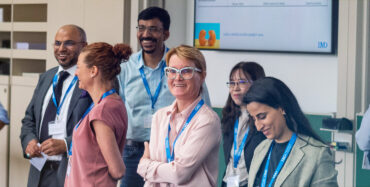
When Russia launched a full-scale invasion of Ukraine on 24 February, like many other Ukrainians, Nadia Kobyliak and Oksana Lesyk were determined to stand with their countrymen and women. The two women, both public sector project managers working on civil and corporate governance reforms at some of Ukraine’s 3,500 State-Owned-Enterprises (SOEs) and its public institutions, divided their time between helping their families, their local communities and colleagues fleeing Kyiv, and ensuring that the country kept moving towards reform.
“We were forced to demonstrate our courage and our professionalism to the whole world as we continued to work to keep Ukraine’s infrastructure running smoothly,” said Oksana Lesyk, Senior Project Manager for the Reform Support Team (URA) at Ukraine’s Ministry of Infrastructure. Her work, at the forefront of reforming Ukraine’s public institutions, was dovetailed with supporting her local community during the invasion’s early days.

Oksana Lesyk
However, for Lesyk February’s events also acted as a catalyst to grow and improve professionally.
“I started to look at my personal and professional development from a different angle. I asked, what I could do for myself; how could I be more efficient and a better team leader overall?” she said.
Through colleagues who had studied at IMD, Lesyk was made aware of IMD’s Mobilizing People Program. She realized it was what she had been looking for: the chance to develop her approach to leadership and team management.
Learning to lead in her own style
Meanwhile, Nadia Kobyliak fled Kyiv to western Ukraine, where her parents live. Over the next few weeks, she helped to accommodate her co-workers who arrived in the city and stepped up to manage the team while the company’s director focused on relocating colleagues to safety.
During that time, she started to feel pressured by expectations to adopt a set of behaviors she wasn’t totally comfortable with. A short while later, when a friend sent her a link to IMD’s Strategies for Leadership program, the opportunity to learn how to uncover her most authentic and effective leadership style immediately appealed.
“The first thing that struck me was the phrase ‘find your own path to leadership’,” she said. “When you are not authentic, you expend a lot of energy pretending and it doesn’t make you effective, especially in these crisis situations.”
The two women were enabled to attend their preferred programs thanks to the IMD alumni-funded scholarship, Empowering Women in Leadership through Executive Education, which supports exceptional women who excel in their careers – particularly those who cannot afford a top-tier business education. For Kobyliak and Lesyk, the opportunity to devote some time to focus on their own needs, while also managing continuing crises, was invaluable.
“I realized that there isn’t only one style of leadership. I can have my own style,” said Kobyliak.
Cracking down on corruption
Both Lesyk and Kobyliak work at the forefront of Ukraine’s ongoing development as a reliable civil and business environment. Lesyk’s role at the Ukraine Reforms Architecture (URA) program is aimed at reinforcing public infrastructure and institutions to create transparency and trust and is a joint project with the European Union and the European Bank of Reconstruction and Development (EBRD).

Nadia Kobyliak
Meanwhile, Kobyliak, a qualified accountant, cooperates closely with Ukraine’s government and international organizations, including the EBRD and the OECD, to upgrade the governance of Ukraine’s SOEs and make it easier for them to achieve better results, fight corruption, and attract cheaper and longer-term credit. The ultimate aim is to enable the securities of SOEs to be publicly traded, giving a boost to domestic financial markets.
Since returning to her job following the IMD leadership program, there have been a lot of organizational changes, giving Kobyliak the space to experiment with her style of leadership. While previously she was head of a stream, she now works across multiple projects that demand different types of leadership according to the role.
“The program taught me the importance of speaking up. Now I do it more often and it has worked out well for me in a lot of situations,” she said, expressing her gratitude to all IMD donors who made it possible for her to attend the program. “It was a glimpse of light at the end of the tunnel when it was needed.”
Eyes on the prize
Lesyk’s experience of the two-week course was, she said, exactly what she needed during a time of great uncertainty and loss.
“It was a great opportunity and a very intense period in terms of learning and developing. The mentors were really supportive, and I remain in touch with them even now. The most valuable experience was to open myself for myself and the biggest most relevant insight was to put a safety mask on yourself first, and then to help others. It sounds so easy, but it’s difficult in times of extreme uncertainty,” she said.
The current war has only focused her motivation, and that of her colleagues, she said, adding that the country’s gaze rests on its future success.
“Ukraine’s public institutions, businesses, and civil society leaders and all our international partners are actively working on the country’s recovery plan. We will never be the same, it is true. But our communities are stronger, and they have a clearer vision of our priorities,” she said.


